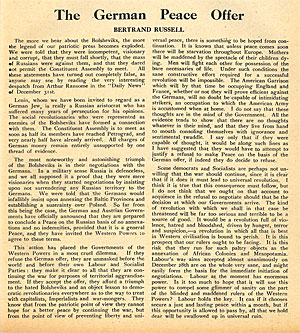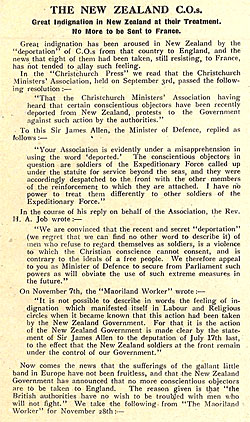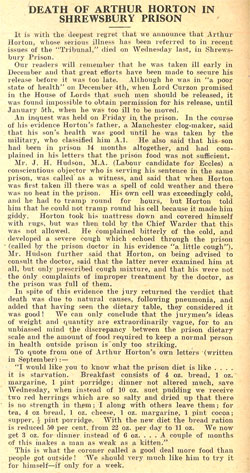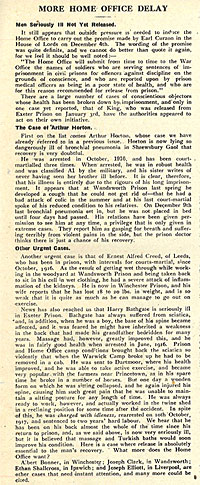
| HOME | TRIBUNAL HOME |
January 1918
To the staff of the NCF and the Tribunal, January 1918 seemed no more hopeful a year than 1917. Conscientious Objectors had been stripped of their political rights in November, and the death of Arthur Butler was a sad resolution to one of the hundreds of stories of COs in dire need of medical attention filtering out of the Home Office Centres and Prisons around the country.
January 3rd: The German Peace Offer
Perhaps the sole ray of light in early 1918 was the developing situation in Russia. The newly ensconced Revolutionary Government was pursuing peace initiatives with Germany, and the headline article of this issue eagerly seized on the possibility of a general peace to come. Betrand Russell reports that:
“the German and Austrian governments have officially announced that they are prepared to conclude a peace on the Russian basis of no annexations... provided it is a general Peace, and they have invited the Western Powers to agree to these terms”
A ll very well and good - providing Russell with a platform to lambast the Western Entente for their refusal to give up dreams of “territorial aggrandisement” and stubborn refusal to concede a “triumph to the hated Bolsheviks”. The article as a whole clearly states some revolutionary tendencies that at the very least skirted the boundaries of legality under the Defence of the Realm Act: “Labour holds the key. It can if it chooses [ed: via revolution] secure a just and lasting peace within a month”. Russell not only calls for Peace, but calls for an uprising to secure it!
ll very well and good - providing Russell with a platform to lambast the Western Entente for their refusal to give up dreams of “territorial aggrandisement” and stubborn refusal to concede a “triumph to the hated Bolsheviks”. The article as a whole clearly states some revolutionary tendencies that at the very least skirted the boundaries of legality under the Defence of the Realm Act: “Labour holds the key. It can if it chooses [ed: via revolution] secure a just and lasting peace within a month”. Russell not only calls for Peace, but calls for an uprising to secure it!
But on what basis was Russell writing? The free and equitable peace that Germany seemed to offer the Entente seems to have got lost on it’s way into history, with the early negotiations between Germany and Russia taking on a remarkably different character, with economic and territorial reparations, a free hand for Germany in the Baltic states and the creation of Poland subject to a plebiscite on it’s governance. While Germany did offer a peace free of reparations and territorial exchange in the West, none of this applied to Russia. Only two months later the Treaty of Brest-Litovsk established peace on the Eastern front, but at a heavy cost in territory, money and lives while setting up perfect conditions for decades of border skirmishes - exactly the kind of peace treaty the NCF feared.
Russell may have been optimistic in his belief that the German peace offer was everything that it seemed, but it’s more likely that it simply provided a platform for his position encouraging revolution as a political strategy. The article is light on detail, and heavy on rhetoric, describing the government, for example, as thoughtless, “living from hand to mouth consoling themselves with ignorance and sentimental twaddle”. While the Tribunal had been outspoken in it’s criticism of the government before, such blatantly pro-revolution propaganda would have serious repercussions only months later.
January 10th: More Home Office Delay
Though international news dominated the lead and editorial articles in January, much of The Tribunal continues to monitor the increasingly desperate situation of the men in prisons and Home Office Centres.
Of primary importance to the NCF was securing the release from prison of critically ill COs, newly allowed under the concessions passed in November 1917. The NCF began to list, on a weekly basis, the situation and conditions of individual COs eligible for release, hoping for updates and any help that could be given. The political operators in the NCF could successfully pressure the Government to issue release orders for individual men - but it had to know of their situation first, and gather support from it’s membership in order to secure a discharge. In this issue, Arthur Horton, Ernest Creed and Harry Bathgate have their cases outlined. Each man was a long-term prisoner, having spent at least 18 months imprisoned, and were now reaching a precarious state of health.
At this point, the ultimate fate of men released from prison due to ill health was not known. The article lists several men who had been released - including Clifford Allen, now being nursed back to health and soon to return to the pages of the Tribunal - but only one who had been transferred to Army Reserve W, and in effect released from the army; Stephen Hobhouse. As the Tribunal states: “a most unsatisfactory state of affairs, as it leaves it open to the Home Office to send the men back to prison on their recovery”.
January 17th - New Zealand COs
 We last heard from the New Zealand COs in October 1917, as they were awaiting punishment on Salisbury Plain. Their experiences had not gone unnoticed at home, and The Tribunal was delighted to announce that the NZ Government had announced that no more COs were to be deported to the front, and those who had been sent were to be returned to New Zealand. Through their own stand, and the efforts made on their behalf both in New Zealand and Britain, they were soon to be returned home - not released from the army, but no longer subject to military discipline at the front.
We last heard from the New Zealand COs in October 1917, as they were awaiting punishment on Salisbury Plain. Their experiences had not gone unnoticed at home, and The Tribunal was delighted to announce that the NZ Government had announced that no more COs were to be deported to the front, and those who had been sent were to be returned to New Zealand. Through their own stand, and the efforts made on their behalf both in New Zealand and Britain, they were soon to be returned home - not released from the army, but no longer subject to military discipline at the front.
The Tribunal was understandably proud of the men:
“Once more we should like to express our deep appreciation of the stand these New Zealand comrades have made... They have by their resistance made the path of the Conscientious Objector in New Zealand an easier one, and will be hailed by their comrades there as pioneers who have borne the brunt of the battle.”
January 24th: Death of Arthur Horton
Arthur Horton was named in each of the January 1918 issues of the Tribunal, with frequent updates on his health, standing almost as a test-case for Lord Curzon’s promise of release for ill COs. Sadly for Arthur, this guarantee proved to be as hollow as all others received by COs during the war.
 Arthur Horton died on January 16th, after a month of concerted effort by family, friends and the NCF to secure his release to hospital. Fourteen months of prison had destroyed his health, and the starvation diet he was subjected to led inexorably to illness and death. Fellow prisoner James Hudson attested at the inquest that the vicious cold, meagre rations and malpractice of the prison doctor were responsible for Arthur’s death. The inquest inevitably pardoned both the individuals and system responsible.
Arthur Horton died on January 16th, after a month of concerted effort by family, friends and the NCF to secure his release to hospital. Fourteen months of prison had destroyed his health, and the starvation diet he was subjected to led inexorably to illness and death. Fellow prisoner James Hudson attested at the inquest that the vicious cold, meagre rations and malpractice of the prison doctor were responsible for Arthur’s death. The inquest inevitably pardoned both the individuals and system responsible.
The NCF was becoming more aware of the unsustainable drop in the quantity of rations afforded to COs, and bitterly aware that there was little that could be done. Voluntary rationing had begun in Britain in 1917, but compulsory control over foodstuffs was soon to be introduced - in the face of widespread food control and anti-CO feeling, the Tribunal could only remark bitterly towards the coroner that pronounced Arthur’s diet more than sufficient: “We should very much like him to try it for himself - if only for a week.”
Clink on images to enlarge

